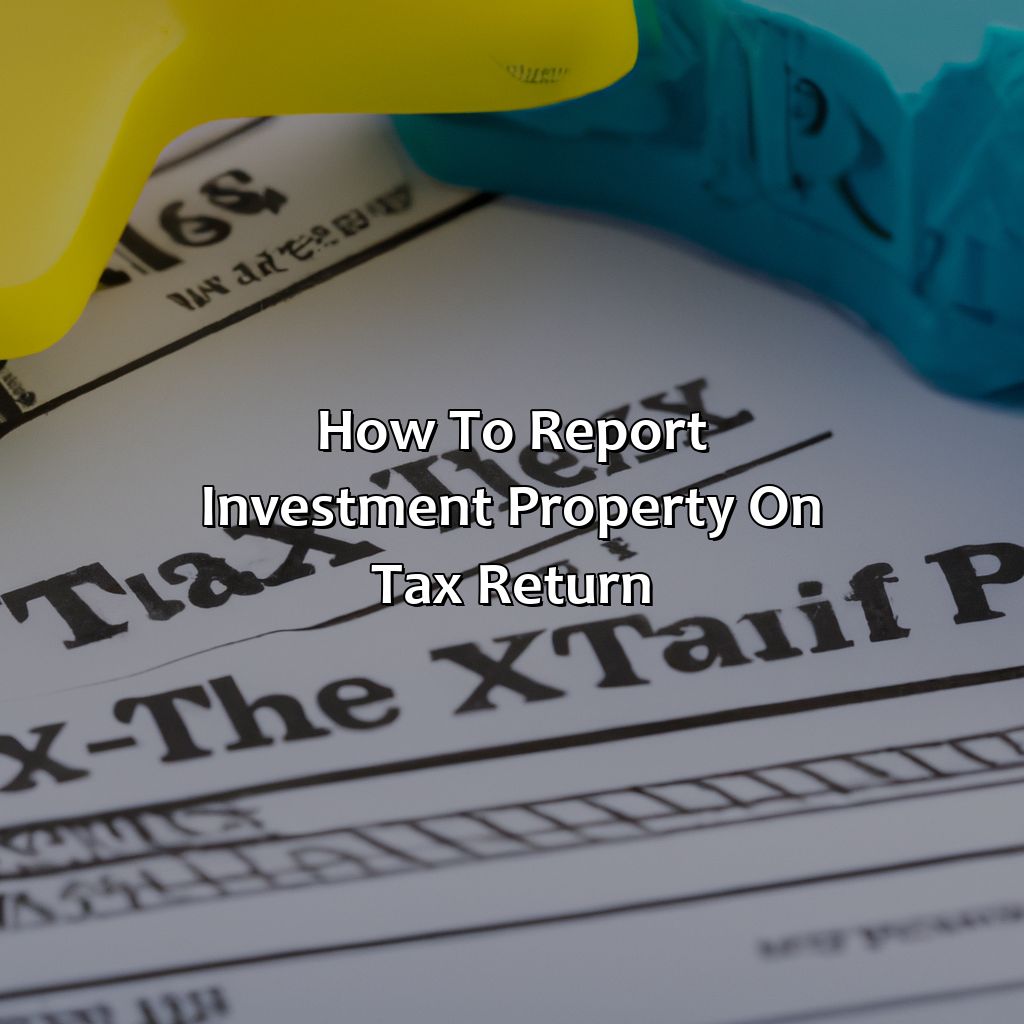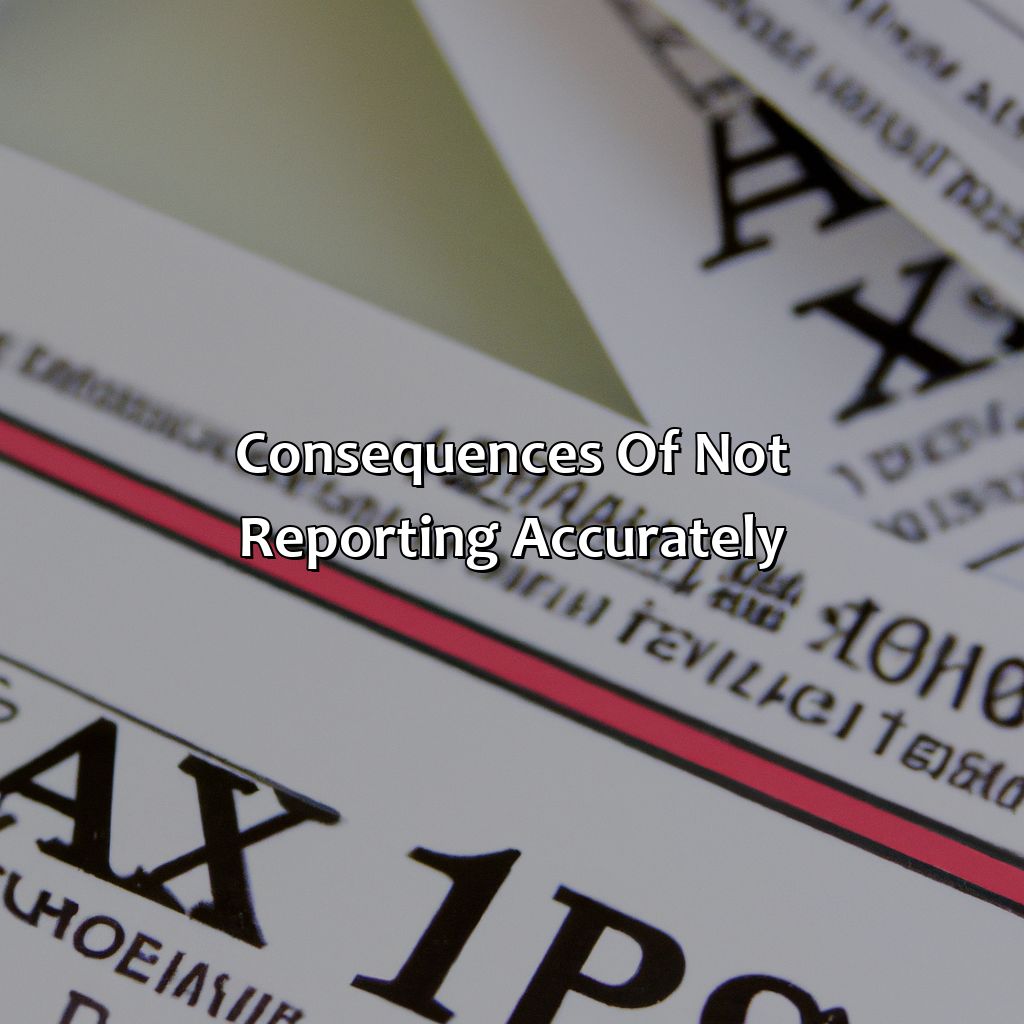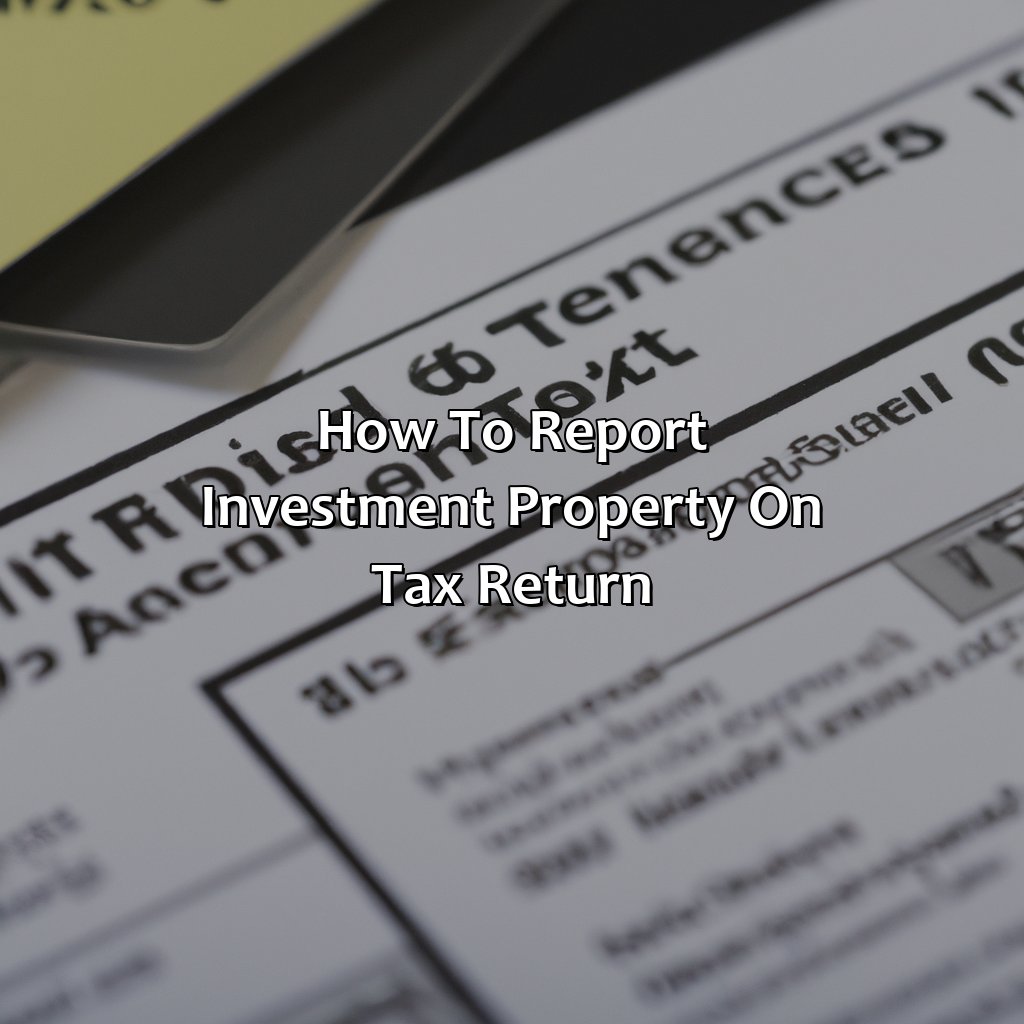How To Report Investment Property On Tax Return?
Key Takeaway:
- Investment property refers to real estate that is purchased with the intention of earning rental income or for capital appreciation. Examples include rental properties, vacation homes, or commercial property.
- Reporting investment property on tax returns involves filling out the appropriate forms, such as Schedule E (Form 1040) for rental income and expenses, and Form 4562 for depreciation. It’s important to accurately report all income and expenses to avoid penalties or audits.
- Capital gains and losses from the sale of investment property must also be reported on tax returns. If a property is held for less than a year, it’s considered a short-term capital gain or loss, while properties held for more than a year are considered long-term.
Is your investment property creating a headache for you when it comes to taxes? You don’t have to worry, as we’ll guide you through reporting your property on your tax returns. Let us help you to understand the process and maximize your deductions.
What is investment property?
Do you want to get the scoop on investment property? Here’s the deal: we’ll cover all the basics. Definition, types, and how to report it on tax return. That way, you can make informed decisions during tax season. So, read on!

Image credits: retiregenz.com by David Arnold
Definition
Investment Property – The Formal Definition
An investment property is a real estate property that is purchased with the intent of investing in it to generate income. It is different from a principal place of residence, as an owner does not reside there but rather rents or leases out the space. Investment properties are usually owned by individuals or companies, and they can include residential and commercial buildings, land, and rental properties.
- Investment properties are purchased for long-term financial gain through rental income, appreciation in value or both.
- The value of an investment property can increase over time resulting in capital gains when the property is sold.
- Investors also consider other factors such as occupancy rates, vacancy rates, operating expenses and net operating income before purchasing an investment property.
- The tax treatment for investment properties can be complex. Rental income must be reported on tax returns along with any expenses related to maintaining the property.
- If the investor sells the property at a value higher than its purchase price, then they will need to pay capital gains taxes.
Investment properties offer investors a variety of benefits including diversification of their portfolio and increasing cash flow. However, it’s important to note that investing in real estate comes with risks such as market fluctuations and unforeseen expenses.
If you’re interested in investing in an investment property, consult with a professional financial advisor who can provide guidance and support through every step of the process. Don’t miss out on potential opportunities to grow your wealth through this lucrative avenue!
If you’re not sure what type of investment property to go for, just remember: there’s nothing wrong with having a diverse portfolio of haunted houses and beachfront vacation rentals.
Types of investment property
Investment properties come in different forms, ranging from residential, commercial, industrial, and land. Each with its unique potential for investors based on capital gains or rental income.
| Types of Investment Property | Description |
| Residential | Homes, apartments, duplexes rented out to tenants for living purposes. |
| Commercial | Retail stores, office buildings, warehouses rented out to business owners. |
| Industrial | Factories, manufacturing or production plants rented out to companies. |
| Land | Vacant and undeveloped land bought as an investment. |
While each type may require varying levels of knowledge and experience before investing, they all offer benefits to personal finance. Investing in real estate can be a long-term investment that may serve to secure wealth against the uncertainties of inflation.
Interested in building a portfolio through real estate investments? Seek professional guidance from a registered financial advisor today to avoid expensive investment mistakes and receive expert advice tailored to your needs. Don’t let opportunities pass by without maximizing the full potential of your assets.
Reporting investment property on your tax return is like doing your own dental work – painful, time-consuming, and best left to the professionals.
How to report investment property on tax return?
Four factors are essential for reporting your investment property on your tax return correctly. These are forms, rental income and expenses, depreciation, and capital gains/losses. Tackle them to help you file your taxes without errors or penalties!

Image credits: retiregenz.com by David Woodhock
Required forms
To report investment property on the tax return, there are certain official documents that need to be filled out. These forms play a critical role in reporting rental income or loss to the government.
For Required Forms, we have created a table below with the necessary columns:
| Form Name | Use | Where to Find |
|---|---|---|
| Schedule E (Form 1040) | To report rental income and expenses | IRS Website or Tax Software |
| Form 4562 | To claim depreciation and amortization deduction on rentals | IRS Website or Tax Software |
| Form 4797 | To report gain or loss from sale of rental property | IRS Website or Tax Software |
It is important to keep in mind that each form has a specific function and purpose. Neglecting to file them can lead to not only penalties but also unnecessary stress during an audit.
While filling out these forms, make sure you report all the necessary details regarding the property and its income/expenses. You’ll need accurate records of any costs associated with maintenance, repairs, and mortgage interest.
A friend of mine failed to keep track of all their sources of rental income for several years. Consequently, they faced a significant penalty from the IRS for filing inaccurate returns without proper documentation. By taking heed and keeping detailed records of your transactions, you ensure that you never face this issue.
Renting out your investment property may bring in some extra cash, but be prepared to see a lot of it disappear come tax season.
Rental income and expenses
To manage the tax return for your rental income and expenses, you need to report them correctly. This information can be reported by using Schedule E (Form 1040), Supplemental Income and Loss.
The following table outlines the Rental income and expenses briefly:
| Item | Description |
|---|---|
| Gross Rental Income | The total amount of rental income received from your tenants during the year before any expenses were deducted. |
| Rental Expenses | Ordinary and necessary expenses that are useful in maintaining, managing or operating income-producing property |
| Depreciation | An allowance for property wear and tear, deterioration, or obsolescence over time |
| Net Rental Income/Loss | The Gross rental income minus the total deductible rental expenses provides you with the net rental income/loss. |
It’s essential to know some unique details about how to report investment property in a tax return properly. According to IRS rules, long-term rental properties can be eligible for a lower tax rate on the capital gains if held for more than one year before selling at a profit.
For instance, Sarah purchased a duplex property ten years ago with an intention of renting it out. She has been reporting this income and expense accurately every year using Schedule E of Form 1040 since then.
In summary, reporting investment properties’ taxes is not difficult, but neither is it straightforward due to complex reporting forms such as Schedule E of Form 1040 designed explicitly by the IRS to cover all possible scenarios involved in owning rentals.
You can’t stop father time, but you can make him work for you by claiming depreciation on your investment property.
Depreciation
The decrease in the value of an investment property over time is called ‘Asset Depreciation.’ It is important to report this on your tax return to avail of all possible tax benefits.
Depreciation enables the property owner to claim a deduction on their taxes that equates to the asset’s value that was lost. In simpler terms, any loss caused due to general wear and tear or aging can be claimed as a deduction.
It is essential to note that different types of properties have different depreciation schedules. Residential properties are depreciated differently than commercial ones. Research these schedules in advance while reporting.
An Australian Property Tax Specialist reports, “Following a correct depreciation schedule can lead to substantial savings for investment property owners.”
Capital gains and losses: where math and emotions collide, resulting in either celebration or crying into your tax forms.
Capital gains and losses
When it comes to your tax return, the declaration of capital gains and losses is an essential task. This refers to the income or loss that comes from selling investments, such as rental property. Failing to report them accurately could result in penalties or fines.
To report your investment property on your tax return, you’ll need to provide information about the purchase price, any improvements or repairs made, and any depreciation claimed. You’ll also need to document the sale price and selling expenses.
It’s important to note that there are different rules for reporting short-term and long-term capital gains, so make sure you know which category your investment property falls under before filing.
Pro Tip: Consider consulting with a tax professional experienced in investment properties to ensure accurate reporting and potentially minimize taxes owed.
Skipping accurate reporting on your investment property is like playing Russian roulette with your tax returns – except the consequences could be more painful than a bullet to the head.
Consequences of not reporting accurately
Accurate reporting of investment property on tax return is crucial to avoid negative consequences. Failure to report correctly may lead to penalties, investigations, and even legal issues. The tax authorities may charge fines and back taxes, which can be a significant financial burden on the taxpayer. Inaccurate reporting can also lead to a loss of credibility and trust with the tax authorities, which could affect future reporting requirements.
It is essential to ensure that all income and expenses related to the investment property are accurately reported. Failure to report rental income, mortgage interest, property taxes, and repairs and maintenance expenses can result in inaccurate reporting and may attract the attention of tax authorities.
In addition, not reporting capital gains or losses from the sale of investment property can lead to penalties and legal issues. It is important to keep accurate records of the purchase price, improvements made, and selling price to calculate the correct capital gains or losses.
Ignoring or misreporting income from investment properties can lead to serious consequences. Failing to report rental income, capital gains, or other investment earnings is tax fraud, which could result in criminal charges and fines.
According to the Internal Revenue Service (IRS), failure to report accurate information on tax return can result in a 20% accuracy-related penalty. It is important to seek guidance and consult with a tax professional to report investment property accurately and avoid negative consequences.
A true fact: According to the Internal Revenue Service (IRS), in the fiscal year 2020, they initiated over 2.4 million audits, with over 1 million of them being Individual Income Tax Return Audits.

Image credits: retiregenz.com by Harry Woodhock
Five Facts About How To Report Investment Property On Tax Return:
Investment property can include rental homes, commercial properties, and land held for investment purposes. (Source: TurboTax)
Rental income must be reported on your tax return, and you can deduct expenses such as property taxes, mortgage interest, and repairs. (Source: IRS)
Depreciation is a key tax deduction for investment property owners but must be calculated accurately and recaptured when the property is sold. (Source: Nolo)
Capital gains tax applies when you sell an investment property for a profit, and the rate varies depending on how long you held the property and your income level. (Source: Forbes)
Tax rules regarding investment property can be complex, and it’s essential to seek the advice of a qualified tax professional. (Source: The Balance)
FAQs about How To Report Investment Property On Tax Return?
How do I report my investment property on my tax return?
To report your investment property on your tax return, you will need to fill out IRS Form 1040 Schedule E. This form is used to report rental income and expenses associated with your investment property. You will also need to include any depreciation expenses and capital gains or losses on the sale of the property.
What expenses associated with my investment property can I deduct on my tax return?
You can typically deduct expenses such as property taxes, mortgage interest, repairs and maintenance, insurance, and management fees from your rental income on your tax return. However, it is important to consult with a tax professional to ensure you are claiming all eligible deductions.
Do I have to pay taxes on the rental income from my investment property?
Yes, rental income from your investment property is considered taxable income and must be reported on your tax return. However, you may be able to offset some of the rental income with deductible expenses.
What is depreciation, and how do I calculate it on my investment property for tax purposes?
Depreciation is a tax deduction that allows you to recover the cost of your investment property over time. To calculate depreciation on your investment property, you will need to divide the value of the property (minus the value of the land) by 27.5. This will give you the amount you can deduct each year for depreciation on your tax return.
How do I report the proceeds from the sale of my investment property on my tax return?
To report capital gains or losses from the sale of your investment property on your tax return, you will need to fill out IRS Form 4797. You will also need to include any depreciation deductions you have taken on the property over the years and calculate the adjusted basis for the property.
What tax implications should I be aware of when I convert my investment property into my primary residence?
If you convert your investment property into your primary residence, you may be eligible for certain tax benefits, such as the primary residence exclusion for capital gains. However, there may also be tax implications, such as recapturing depreciation deductions taken on the property. It is important to consult with a tax professional before making any changes to your investment property.
 Checkout this IRS Loophole
Checkout this IRS Loophole 
